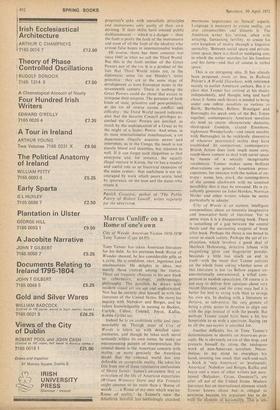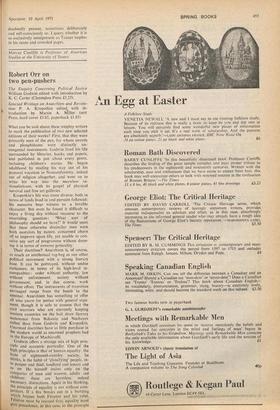Marcus Cunliffe on a Rome of one's own
Tony Tanner has taken American literature for his field. As his previous book Reign of Wonder showed, he has considerable gifts as a critic. He is confident, alert, ingenious and uncensorious. He delights in ideas, not merely those current among the literati. There are frequent allusions in his new book to cybernetics, ecology, anthropology, philosophy. The parallels he draws with modern visual art are apt and sophisticated. Nor has he entirely shut himself in with the literature of the United States. He starts his inquiry with Nabokov and Borges, and he refers knowledgeably in passing to Beckett, Carlyle, Caline, Conrad, Joyce, Kafka, Robbe-Grillet etc.
Indeed he is an ambitious critic and com- mendably so. Though most of City of Words is taken' up with detailed com- mentaries, and though he takes each novel seriously within its own terms, he seeks an encompassing pattern of interpretation. His central theme is the American concern with reality, or more precisely the American doubt that the external world has any definable or acceptable reality. He takes his title from one of those ruminative confessions of Henry James: James's awareness that an evocation of the life of American expatriates (William Wetmore Story and His Friends) might amount to no more than a !Rome of words ... a Rome of my own which was no Rome of reality.' In Tanner's view the American 'noveld haS accordingly attached
enormous importance to 'lexical' aspects. Language is necessary to create reality, yet also circumscribes and distorts it. The American writer has striven; often with amazing, fantasising fertility, to create his own kingdom of reality through a linguistic surreality. 'Between social space and private, inner space, there is a third or mediating area in which the writer searches for his freedom and his form—and that of course is verbal space.'
This is an intriguing idea. It has already been proposed, more or less, in Richard Poirier's A World Elsewhere, with reference mainly to earlier American authors. But it is clear that Tanner has arrived at his theory independently, and thought long and hard about. it. Some such theory is needed to bring under one rubric novelists as various as Barth, Barthelme, Bellow, Brautigan and Burroughs (to speak only of the Bs). Taken together, contemporary American novelists do tend to create idiosyncratic domains, third-space Gondals, crazed Erewhons, nightmare Wonderlands—and (most notably with Burroughs) to be recklessly dismissive of whatever provisional reality they have established. In comparison, contemporary British fiction does look much more cosy, much•More content to deal with social space by - means of a socially recognisable vocabulary. Tanner makes some brilliant observations on general American preoc- cupations, for instance with the notion of en- tropy : waste, loss, dreck, the running-down of the cosmic clockwork with no assumed possibility that it may be rewound. He is ex- cellently generous on John Hawkes, Norman Mailer and other writers whom he seems particularly to admire.
City of Words is an earnest, intelligent compendium, about an intensely imaginative and innovative body of literature. Yet in some ways it is a disappointing book. There is something of a gap between the central thesis and the succeeding exegesis of book after book. Perhaps the thesis is too broad to cover so much variety. Perhaps the act of ex- planation, which involves a good deal of Sherlock Holmesing, detective labour with magnifying glass and fingerprint powder, becomes a little too niuch an end in itself—with the result that Tanner refrains on the whole from asking whether some of this literature is not las Bellow argues) un- conventionally conventional, a tribal com- petition in modish apocalypse. Of course it is not easy to deliver firm opinions about very recent literature, and the critic may feel it is better for him to swing with than to swinge his own era. In dealing with a literature so derisive, so subversive. the very gesture of being a critic seems to threaten to align one with the pigs instead of with the people. But perhaps Tanner could have been a bit less hospitable to so wide a spectrum. Saying yes to all the nay-sayers is uncalled for.
Another difficulty lies in Tony Tanner's determination to identify an American prin- ciple. He is obviously aware of this trap, and protects himself by citing the analogous work of non-American novelists. Never- theless, to my mind he overplays his hand, insisting too much that such-and-such a book is 'very American' or 'profoundly American'. Nabokov and Borges, Kafka and Joyce and a mass of other writers not men- tioned (Bulgakov, Grass, Queneau?), are after all not of the United States. Modern literature has an international element which Tanner knows about but is obliged to minimise because his argument has to do with the clement of nationality. This is"tiii;.
doubtedly present, sometimes deliberately and self-consciously so. 1 query whether it is so exclusively omnipresent as Tanner implies in his acute and crowded pages.
Marcus Cunliffe is Professor of American Studies at the University of Sussex











































 Previous page
Previous page